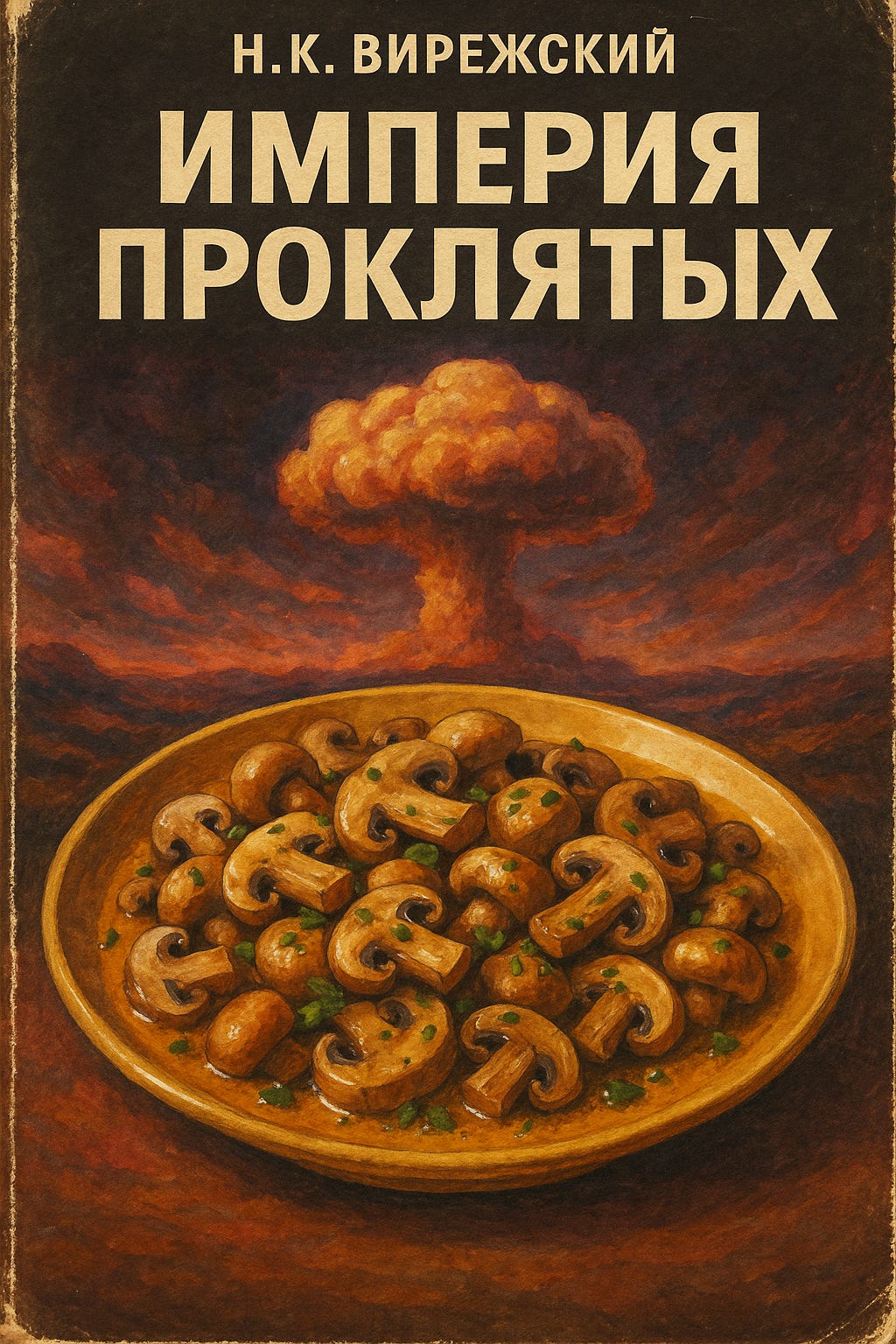Empire of the Damned—By N.K. Virezhsky, Author of “Almost Real”
In which the King in Orange strokes the prominent red switch...
📘 NEW: Empire of the Damned (by N.K. Virezhsky)
The King in Orange dreams of buttered mushrooms and holy fire. Gas-guzzling freedom demands obedience—and some nations just won’t play ball. Enter the Apocalypse Console. Red switch. Stirring loins. Invisible gods. A surreal fable from the author of Almost Real, filed under simulation fiction, war theology, and petrochemical metaphysics.
🧠 Tags: surreal fiction, political satire, King in Orange, empire in decline, nukes and mushrooms
The King in Orange was giddy with anticipation. The Apocalypse—it was always his dream. His destiny. His divine calling.
He breathed a satisfied sigh, imagining a plate of mushrooms sautéed in garlic and butter. Fungi had always stirred something deep in him. Perhaps it was their earthy rot. Perhaps it was the shape. Or perhaps it was because some mushrooms could kill.
His thoughts turned—inevitably, compulsively—to the lands in the middle of the East. Some he called allies, others he loathed. Mostly he coveted what lay beneath them: the raw materials. The fuels. The black blood of freedom.
They refused to bow before him.
This alone enraged him more than any policy or border dispute. The King in Orange believed such insolence was not just a diplomatic failure—it was blasphemy against the Great Empire itself.
For in the Great Empire, there was only one true symbol of liberty: the gas-guzzling, smoke-belching, four-wheeled gadabout. The sacred automobile.
The King had declared them holy icons. They stood for FREEDOM—a concept reduced to six lanes of asphalt, with strip malls, drive-thrus, and fluorescent-lit rest stops as altars of worship. Try walking somewhere—on foot, on Shank’s Pony—and the wrath of order would find you.
And this was just.
It was the will of the invisible being they called God. The same God who adored the Empire’s citizens—so long as they returned the favor, feared Him properly, and surrendered body and soul to the Empire’s machinery.
Now, this invisible God had spoken. He told the King in Orange to support one of the Eastern nations. The one where, long ago, His Son had supposedly wandered and preached for some thirty-three years.
The logic was... elastic.
It baffled the citizens of lands like Albion, where belief in invisible entities had long since waned. The people of Albion, it seemed, had an unfortunate attachment to evidence. They no longer saw angels in thunderclouds, or divine plans in real estate deals.
And for this, the King hated them. Anyone who failed to see the invisible was suspect.
Still, his divine orders were clear. He must support the land where the Son once walked—especially now that it was bombing its neighbor. That neighboring land, of course, had resources. Needed things. Things the Empire could siphon and burn. Righteous combustion.
And then came the second vision.
Mushrooms again. But now vast, blossoming in the sky.
He shuddered with a holy ecstasy. Yes. Yes! These too were gifts of God—clouds of revelation, portents of purification. His loins stirred. He felt the presence of God enter the room. The King whispered thanks, trembling with joy.
He strolled to the Console of Decision—a gleaming monstrosity of blinking lights and gleaming steel, fit for a King. His fingers hovered over the prominent red switch. He stroked it. Once. Twice. Reverently.
The stirring in his loins became a frenzy.
He rubbed the switch gently back and forth, imagining the clouds blooming, the fire raining, the distant screams softened by elevation and insulation.
This was judgment. This was power.
The disobedient nations—they were like tantrumming toddlers, insolent and untrained. They needed punishment. Correction. Perhaps annihilation.
The King in Orange smiled. So did God.
And the red switch waited.
Just one stroke away from salvation.
📄 AUTHOR’S ENDNOTE
Appended by the Bureau of Almost Real Affairs
It has been suggested by some critics that Empire of the Damned is a satirical work. Others insist it is prophecy. A few—mostly residents of recently vanished principalities—claim it is a confession in code.
The author, however, insists it is simply a cookbook entry. A meditation on mushrooms. A culinary daydream with mild geopolitical garnish. Any similarities to actual empires, orange sovereigns, or divine endorsements of bombing campaigns are, naturally, products of the reader’s deranged imagination.
We note with some concern that the work was composed over the course of seven nights in a sealed room, lit only by the static flicker of expired broadcast channels. The manuscript was delivered wrapped in butcher paper and accompanied by a clump of dried chanterelles, which exuded a scent curiously reminiscent of cordite and despair.
In accordance with Directive 88-B: On the Maintenance of Dreamlike Coherence in Public Literature, we affirm that this tale is entirely fictional. There are no red switches. No great consoles. No invisible gods whispering in the ears of madmen.
All is well.
Everything is under control.
Please return to the shopping mall.
– V.
Ministry for Literary Paradoxes and Post-Reality Integration
Subdivision for Mushrooms, Metaphysics, and Military Entertainment


